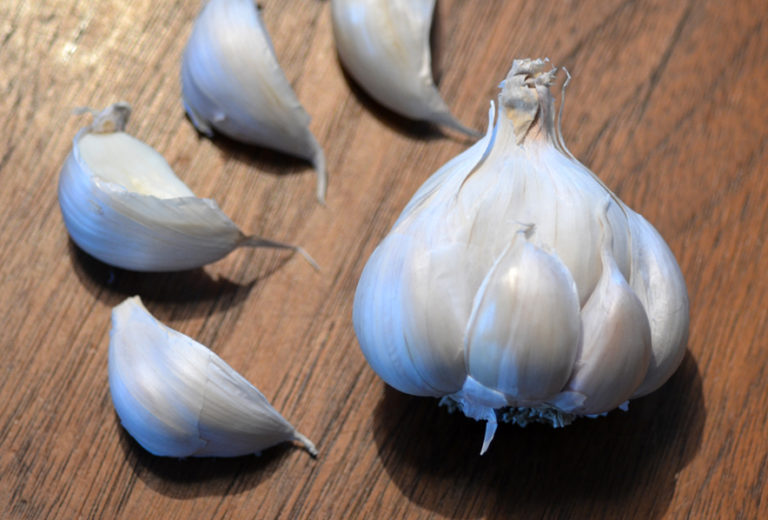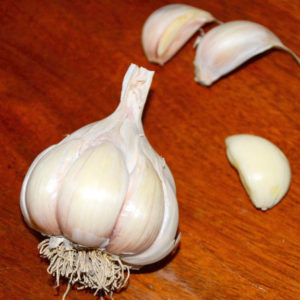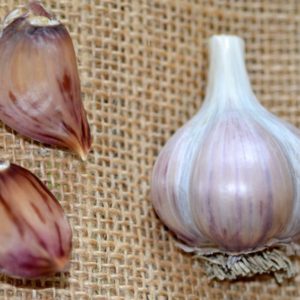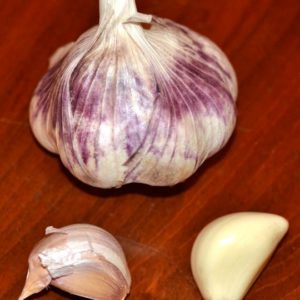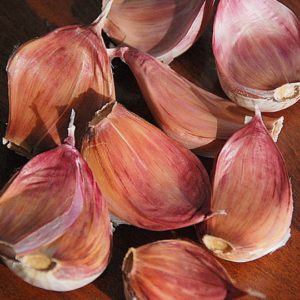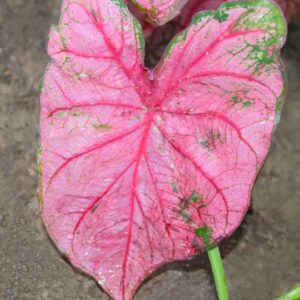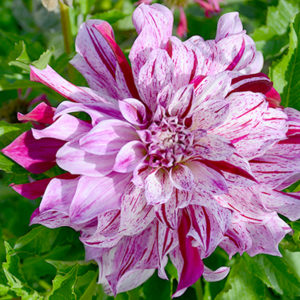Description
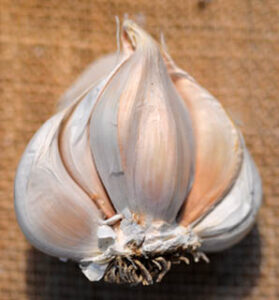 Silverskin Garlic, Sicilian Silver
Silverskin Garlic, Sicilian Silver
GARLIC, which is a member of the same group of plants as the ONION, has been cultivated for millennia. As a cultivated plant, it is so old that it is difficult to credit a country of origin for this vegetable. Some historians believe that onions and garlic was indigenous to the southwest of Siberia and spread to southern Europe where it became naturalized. It is widely grown in all the Mediterranean countries.
All modern garlic belongs to one of two subspecies: hardneck (ophioscorodon) or softneck (sativum). Hardneck subspecies try to produce flower stalks with small aerial cloves called bulbils. Hardnecks will not produce large bulbs underground unless the flower stalks are removed. There are seven varieties of hardneck garlic: Asiatics, Purple Striped, Glazed Purple Stripe, Marbled Purple Stripe, Porcelain, Turban and Rocambole. Softnecks have lost the ability, for the most part, to produce a flower stalk. However, under certain climatic situations, the bulbs may try to produce a flower stalk known as bolting. There are four varieties of softneck garlic: Artichoke, Turban, Silverskin and Creole.
Silverskins are the garlic cultivars with which all of us are familiar. In some regions of the country they are known as Italian garlic or Egyptian garlic. They are the garlic varieties that you find in the grocery stores. If stored in proper conditions, some Silverskins can last for more than a year.
The flavor of Silverskins is a controversial topic. Many garlic afficionados argue that flavor has been sacrificed for storage capability. They will tell you that the sulfurous fragrance and taste of the Silverskins compromises their flavor. This is true for some Silverskins but not all. One hint about Silverskins – when cooking, make sure the garlic is sautéed to a deep tan or straw color. This minimizes the sulfurous flavor and brings out the richness of the garlic.
Silverskins are one of the few garlic groups that can be planted in the spring. If you decide to try this, you must plant the garlic as soon as the ground can be worked. If you wait, your garlic will not form a bulb.
Silverskins are among the latest maturing of the garlic groups. They prefer an environment with a long growing season and mild winters, so they are great for more southerly climates. They will also flourish in more northerly climates, but may struggle in Hardiness Zones 1-3. They are some of the most reliable producers of all the garlic groups. The bulbs are, in general, medium size, but the cloves are large for the size of the bulbs.
One distinct peculiarity, sometimes shared with other cultivars in other garlic groups, is the tendency of the Silverskins to change from nonbolting (softnecks) to bolting (hardnecks). Most garlic scholars agree that Silverskins are softnecks. However, when grown in northern climates, Silverskins frequently produce a scape which is associated with hardnecks. When grown in milder climates, Silverskins rarely produce such scapes. Their behavior is much more closely associated with softnecks. Like most garlic classifications, the naming distinctions are fluid.
The Silverskins are in a class by themselves because of their exceptionally long storage capability. If you decide to get into growing garlic, you should choose at least one Silverskin cultivar to include in your collection.

